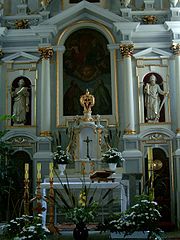
A History Of The Mass And Its Ceremonies In The Eastern And Western Church -Rev John O'Brien A.M.
THE NAMES BY WHICH THE MASS WAS KNOWN IN THE GREEK CHURCH IN EARLY TIMES
One of the strongest arguments against the Hebrew origin of the word Mass is that none of the Oriental Fathers ever made use of Massah, but always employed a different word. With them it was styled indifferently by the following names: Mystagogia, Synaxis, Anaphora, Eulogia, Hierurgia, Mysterion, Deipnon, Teleion, Agathon, Prosphora, and Liturgia.
It was called Mystagogia by St. Dionysius, from the fact that it was a divine participation of, or initiation into, the sacred mysteries. It was termed Synaxis, or the union, because in virtue of it we are all united with Christ our Saviour. The name Anaphora was applied to it from the fact that it raises our minds and hearts to God. The term Eulogia was given it from its propitiatory nature; Hierurgia, because it was a sacred action; Mysterion, from the mysteries it contained; and Deipnon, or banquet, from the fact that it gave us the living Bread unto the eternal nourishment of our souls. Then, again, it was called Teleion, or perfection, because it was the sacrifice of that Holy Lamb, without spot or blemish, who came upon earth to be the perfection and completion of the ancient law. Its name Agathon, or good, was given it because it is the only lasting good upon which man can count; and from the fact that it finally conducts us to the happy end for which we were created, the appellation of Prosphora was given it also. Of all these names enumerated, that of Liturgia was most frequently used, and is exclusively used at the present day throughout the entire East.

 Support Site Improvements
Support Site Improvements